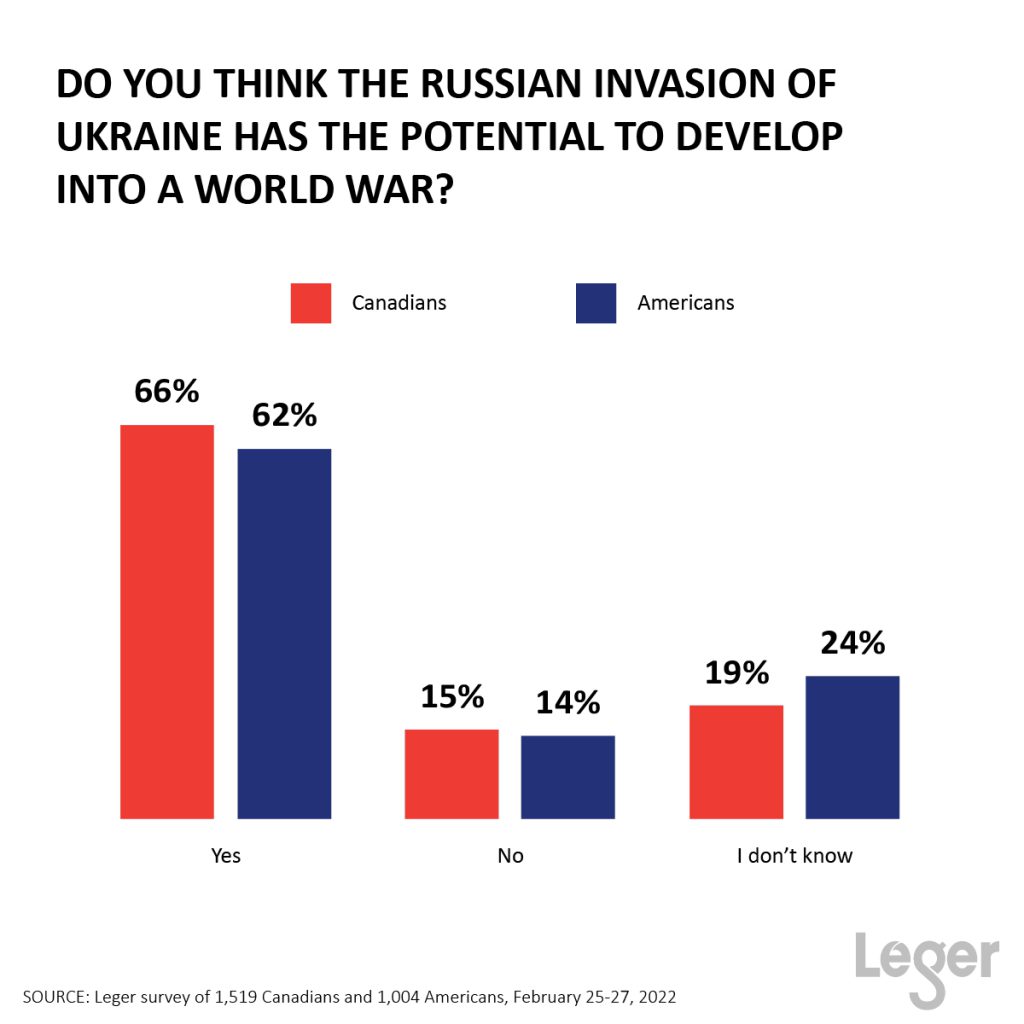Du 25 au 27 février 2022, Léger a mené un sondage pour sonder les opinions des Canadiens et des Américains sur l’invasion russe en Ukraine.
QUELQUES FAITS SAILLANTS DE NOTRE SONDAGE PORTANT SUR L’INVASION DE LA RUSSIE EN UKRAINE…
- 89% des Canadiens et 78% des Américains s’inquiètent personnellement de l’invasion de l’Ukraine par la Russie.
- 66% des Canadiens et 62% des Américains croient que l’invasion de l’Ukraine par la Russie a le potentiel de dégénérer en une guerre mondiale.
- Les Canadiens et les Américains s’entendent sur les premiers pas à faire pour leur pays en relation avec cette invasion :
- 45% des Canadiens et 38% des Américains croient qu’il faut imposer des sanctions économiques plus sévères contre la Russie.
- 21% des Canadiens et 19% des Américains croient qu’il faut entamer des négociations avec la Russie pour arriver à un compromis pacifique.
Dans un conflit impliquant la Russie, 37% des Canadiens font confiance au leadership de Justin Trudeau à la tête du Canada, alors que 39% des Américains font confiance à Biden pour diriger les États-Unis dans ce type de conflit.
- 89% of Canadians and 78% of Americans are personally concerned about Russia invading Ukraine.
- 66% of Canadians and 62% of Americans believe the Russian invasion of Ukraine has the potential to develop into a world war.
- Canadians and Americans agree with respect to what their country’s first steps should be based on Russia’s invasion of Ukraine.
- 45% of Canadians and 38% of Americans think stronger economic sanctions should be imposed on Russia.
- 21% of Canadians and 19% of Americans think negotiations should be started to find a peaceful compromise.
- In a conflict with Russia, 37% of Canadians are confident in Justin Trudeau leading Canada and 39% of Americans are confident in Joe Biden leading the United States.

SURVEY METHODOLOGY
- 1,519 Canadians and 1,004 Americans aged 18 or older were surveyed using Leger’s online panel, LEO, from February 25 to 27, 2022.
- Using 2016 Census reference variables, the Canadian data was weighted according to gender, age, mother tongue, region, education level, presence of children in households, and according to the party they voted for in the last federal election in order to render a representative sample of the general population.
- Using 2010 U.S. Census reference variables, the American data was weighted by our statisticians according to gender, age, region, race/ethnicity, household size and education level in order to render a representative sample of the general population.
- A margin of error cannot be associated with a non-probability sample in a panel survey. For comparison purposes, a probability sample of this size would have a margin of error ±2.52%, 19 times out of 20 for the Canadian sample and of ±3.09%, 19 times out of 20 for the American sample.



